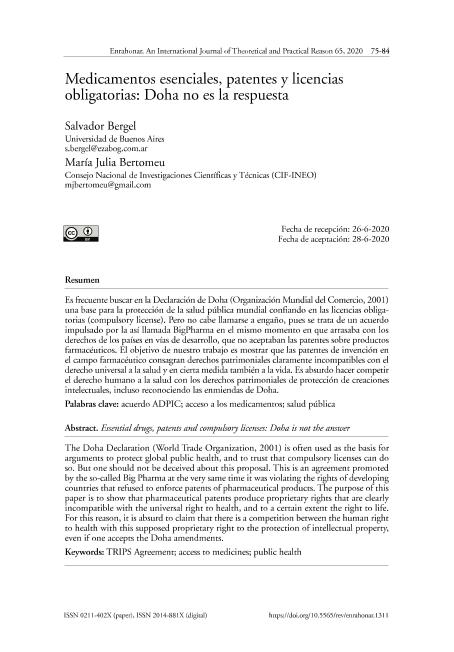Mostrar el registro sencillo del ítem
dc.contributor.author
Bergel, Salvador
dc.contributor.author
Bertomeu, Maria Julia

dc.date.available
2021-09-16T18:44:41Z
dc.date.issued
2020-10-30
dc.identifier.citation
Bergel, Salvador; Bertomeu, Maria Julia; Medicamentos esenciales, patentes y licencias obligatorias: Doha no es la respuesta; Universidad Autónoma de Barcelona; Enrahonar; 65; 30-10-2020; 74-85
dc.identifier.issn
0211-402X
dc.identifier.uri
http://hdl.handle.net/11336/140585
dc.description.abstract
Es frecuente buscar en la Declaración de Doha (Organización Mundial del Comercio, 2001) una base para la protección de la salud pública mundial confiando en las licencias obligatorias (compulsory license). Pero no cabe llamarse a engaño, pues se trata de un acuerdo impulsado por la así llamada BigPharma en el mismo momento en que arrasaba con los derechos de los países en vías de desarrollo, que no aceptaban las patentes sobre productos farmacéuticos. El objetivo de nuestro trabajo es mostrar que las patentes de invención en el campo farmacéutico consagran derechos patrimoniales claramente incompatibles con el derecho universal a la salud y en cierta medida también a la vida. Es absurdo hacer competir el derecho humano a la salud con los derechos patrimoniales de protección de creaciones intelectuales, incluso reconociendo las enmiendas de Doha.
dc.description.abstract
The Doha Declaration (World Trade Organization, 2001) is often used as the basis for arguments to protect global public health, and to trust that compulsory licenses can do so. But one should not be deceived about this proposal. This is an agreement promoted by the so-called Big Pharma at the very same time it was violating the rights of developing countries that refused to enforce patents of pharmaceutical products. The purpose of this paper is to show that pharmaceutical patents produce proprietary rights that are clearly incompatible with the universal right to health, and to a certain extent the right to life. For this reason, it is absurd to claim that there is a competition between the human right to health with this supposed proprietary right to the protection of intellectual property, even if one accepts the Doha amendments.
dc.format
application/pdf
dc.language.iso
spa
dc.publisher
Universidad Autónoma de Barcelona
dc.rights
info:eu-repo/semantics/openAccess
dc.rights.uri
https://creativecommons.org/licenses/by/2.5/ar/
dc.subject
ACCESS TO MEDICINES
dc.subject
PUBLIC HEALTH
dc.subject
TRIPS AGREEMENT
dc.subject.classification
Ética

dc.subject.classification
Filosofía, Ética y Religión

dc.subject.classification
HUMANIDADES

dc.title
Medicamentos esenciales, patentes y licencias obligatorias: Doha no es la respuesta
dc.title
Essential drugs, patents and compulsory licenses: Doha is not the answer
dc.type
info:eu-repo/semantics/article
dc.type
info:ar-repo/semantics/artículo
dc.type
info:eu-repo/semantics/publishedVersion
dc.date.updated
2021-09-07T18:37:23Z
dc.identifier.eissn
2014-881X
dc.journal.volume
65
dc.journal.pagination
74-85
dc.journal.pais
España

dc.journal.ciudad
Barcelona
dc.description.fil
Fil: Bergel, Salvador. Universidad de Buenos Aires; Argentina
dc.description.fil
Fil: Bertomeu, Maria Julia. Centro de Investigaciones Filosóficas. Instituto de Filosofía "Ezequiel de Olaso" - Consejo Nacional de Investigaciones Científicas y Técnicas. Oficina de Coordinación Administrativa Ciudad Universitaria. Instituto de Filosofía "Ezequiel de Olaso"; Argentina
dc.journal.title
Enrahonar
dc.relation.alternativeid
info:eu-repo/semantics/altIdentifier/url/https://revistes.uab.cat/enrahonar/article/view/v65-bergel-bertomeu
dc.relation.alternativeid
info:eu-repo/semantics/altIdentifier/doi/http://dx.doi.org/10.5565/rev/enrahonar.1311
Archivos asociados
